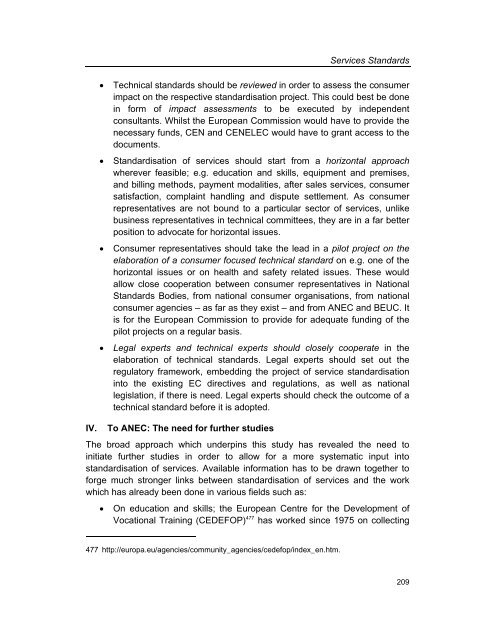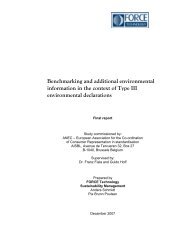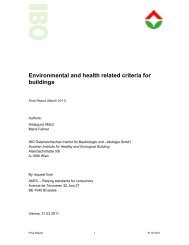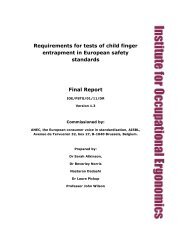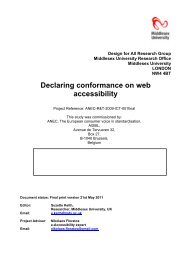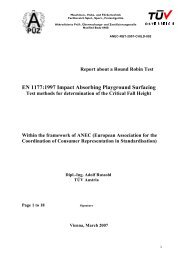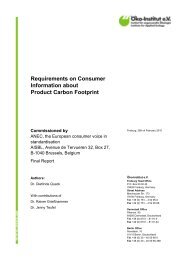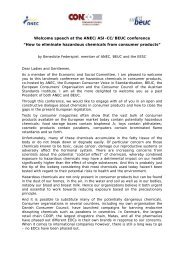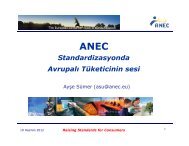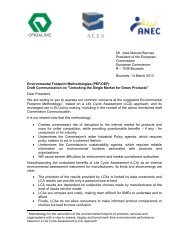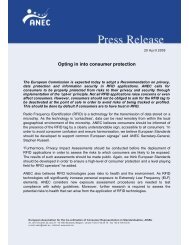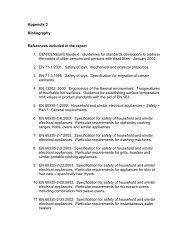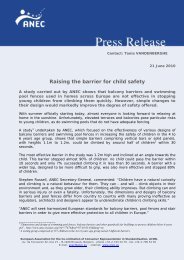Services Standards: Defining the Core Consumer Elements ... - ANEC
Services Standards: Defining the Core Consumer Elements ... - ANEC
Services Standards: Defining the Core Consumer Elements ... - ANEC
Create successful ePaper yourself
Turn your PDF publications into a flip-book with our unique Google optimized e-Paper software.
IV.<br />
<strong>Services</strong> <strong>Standards</strong><br />
• Technical standards should be reviewed in order to assess <strong>the</strong> consumer<br />
impact on <strong>the</strong> respective standardisation project. This could best be done<br />
in form of impact assessments to be executed by independent<br />
consultants. Whilst <strong>the</strong> European Commission would have to provide <strong>the</strong><br />
necessary funds, CEN and CENELEC would have to grant access to <strong>the</strong><br />
documents.<br />
• Standardisation of services should start from a horizontal approach<br />
wherever feasible; e.g. education and skills, equipment and premises,<br />
and billing methods, payment modalities, after sales services, consumer<br />
satisfaction, complaint handling and dispute settlement. As consumer<br />
representatives are not bound to a particular sector of services, unlike<br />
business representatives in technical committees, <strong>the</strong>y are in a far better<br />
position to advocate for horizontal issues.<br />
• <strong>Consumer</strong> representatives should take <strong>the</strong> lead in a pilot project on <strong>the</strong><br />
elaboration of a consumer focused technical standard on e.g. one of <strong>the</strong><br />
horizontal issues or on health and safety related issues. These would<br />
allow close cooperation between consumer representatives in National<br />
<strong>Standards</strong> Bodies, from national consumer organisations, from national<br />
consumer agencies – as far as <strong>the</strong>y exist – and from <strong>ANEC</strong> and BEUC. It<br />
is for <strong>the</strong> European Commission to provide for adequate funding of <strong>the</strong><br />
pilot projects on a regular basis.<br />
• Legal experts and technical experts should closely cooperate in <strong>the</strong><br />
elaboration of technical standards. Legal experts should set out <strong>the</strong><br />
regulatory framework, embedding <strong>the</strong> project of service standardisation<br />
into <strong>the</strong> existing EC directives and regulations, as well as national<br />
legislation, if <strong>the</strong>re is need. Legal experts should check <strong>the</strong> outcome of a<br />
technical standard before it is adopted.<br />
To <strong>ANEC</strong>: The need for fur<strong>the</strong>r studies<br />
The broad approach which underpins this study has revealed <strong>the</strong> need to<br />
initiate fur<strong>the</strong>r studies in order to allow for a more systematic input into<br />
standardisation of services. Available information has to be drawn toge<strong>the</strong>r to<br />
forge much stronger links between standardisation of services and <strong>the</strong> work<br />
which has already been done in various fields such as:<br />
• On education and skills; <strong>the</strong> European Centre for <strong>the</strong> Development of<br />
Vocational Training (CEDEFOP) 477 has worked since 1975 on collecting<br />
477 http://europa.eu/agencies/community_agencies/cedefop/index_en.htm.<br />
209


